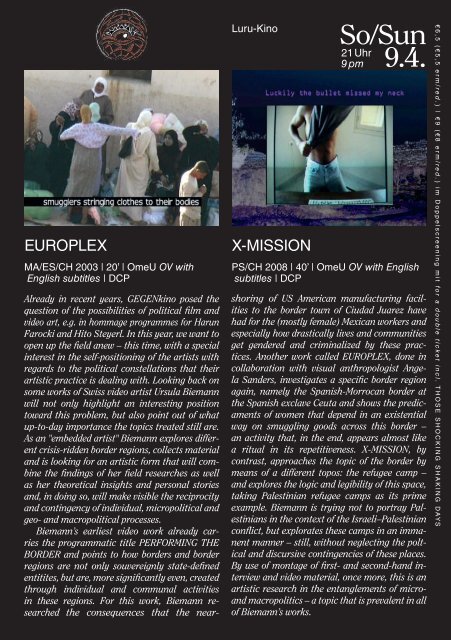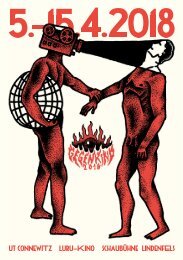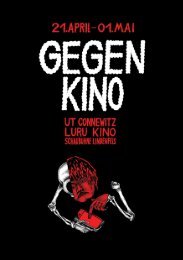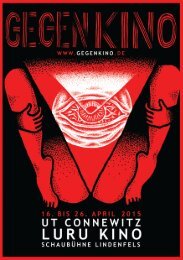Programmheft GEGENkino #4 (06.04.2017—16.04.2017)
Download: 2017.gegenkino.de
Download: 2017.gegenkino.de
Sie wollen auch ein ePaper? Erhöhen Sie die Reichweite Ihrer Titel.
YUMPU macht aus Druck-PDFs automatisch weboptimierte ePaper, die Google liebt.
europlex<br />
Ma/eS/CH 2003 | 20’ | omeu oV with<br />
english subtitles | DCp<br />
luru-kino<br />
x-MiSSion<br />
So/Sun<br />
21 uhr<br />
9 pm 9.4.<br />
pS/CH 2008 | 40’ | omeu oV with english<br />
subtitles | DCp<br />
Already in recent years, <strong>GEGENkino</strong> posed the<br />
question of the possibilities of political film and<br />
video art, e.g. in hommage programmes for Harun<br />
Farocki and Hito Steyerl. In this year, we want to<br />
open up the field anew – this time, with a special<br />
interest in the self-positioning of the artists with<br />
regards to the political constellations that their<br />
artistic practice is dealing with. Looking back on<br />
some works of Swiss video artist Ursula Biemann<br />
will not only highlight an interesting position<br />
toward this problem, but also point out of what<br />
up-to-day importance the topics treated still are.<br />
As an "embedded artist" Biemann explores different<br />
crisis-ridden border regions, collects material<br />
and is looking for an artistic form that will combine<br />
the findings of her field researches as well<br />
as her theoretical insights and personal stories<br />
and, in doing so, will make visible the reciprocity<br />
and contingency of individual, micropolitical and<br />
geo- and macropolitical processes.<br />
Biemann’s earliest video work already carries<br />
the programmatic title PERFORMING THE<br />
BORDER and points to how borders and border<br />
regions are not only souvereignly state-defined<br />
entitites, but are, more significantly even, created<br />
through individual and communal activities<br />
in these regions. For this work, Biemann researched<br />
the consequences that the nearshoring<br />
of US American manufacturing facilities<br />
to the border town of Ciudad Juarez have<br />
had for the (mostly female) Mexican workers and<br />
especially how drastically lives and communities<br />
get gendered and criminalized by these practices.<br />
Another work called EUROPLEX, done in<br />
collaboration with visual anthropologist Angela<br />
Sanders, investigates a specific border region<br />
again, namely the Spanish-Morrocan border at<br />
the Spanish exclave Ceuta and shows the predicaments<br />
of women that depend in an existential<br />
way on smuggling goods across this border –<br />
an activity that, in the end, appears almost like<br />
a ritual in its repetitiveness. X-MISSION, by<br />
contrast, approaches the topic of the border by<br />
means of a different topos: the refugee camp –<br />
and explores the logic and legibility of this space,<br />
taking Palestinian refugee camps as its prime<br />
example. Biemann is trying not to portray Palestinians<br />
in the context of the Israeli–Palestinian<br />
conflict, but explorates these camps in an immanent<br />
manner – still, without neglecting the poltical<br />
and discursive contingencies of these places.<br />
By use of montage of first- and second-hand interview<br />
and video material, once more, this is an<br />
artistic research in the entanglements of microand<br />
macropolitics – a topic that is prevalent in all<br />
of Biemann’s works.<br />
€6,5 (€5,5 erm/red.) | €9 (€8 erm/red.) im Doppelscreening mit for a double ticket incl. THoSe SHoCking SHaking DayS







